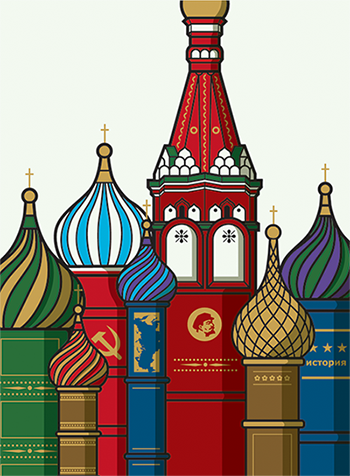Books on Soviet and Russian History

I’m always looking for books that teach me new things about Russia. Here are five that treat different phases of Soviet and Russian history and that I’ve found particularly instructive.
House of Government: A Saga of the Russian Revolution, by Yuri Slezkine (Princeton University Press, 2017)
Published in August, this book covers the late tsarist period through the late 1930s in a unique and compelling way. Rather than treating high politics as practiced in the Kremlin, it chronicles the public and private lives of residents of a massive Moscow housing project for the governing elite, containing not only apartments but stores, a movie theater and a swimming pool. We follow their lives as they evolve from fanatic Bolshevik revolutionaries—dreaming of a Marxist utopia and ready to shed blood to create it—to victims of Stalin’s terror, taken away in the middle of the night by his secret police. Using diaries, letters, memoirs, interviews and hundreds of rare photos, Slezkine combines history, biography and social theory to produce a huge (1,096 pages, 1.5 pounds) but often mesmerizing cornucopia of a book.
Moscow 1956: The Silenced Spring, by Kathleen E. Smith '87 (Harvard University Press, 2017)
This book homes in on the time, three years after Stalin’s death, when the bill for horrors he wrought almost came due. In February 1956 Nikita Khrushchev gave a “secret speech” denouncing Stalin at the 20th Communist Party Congress, letting loose what at first seemed a torrent of change. This speech didn’t stay secret for long: it was read to millions of party members around the country. Smith tells the inspiring, poignant stories of writers, scientists, students and others who, prompted by the speech, dared to denounce Stalin’s regime. But such outbursts often got them arrested, invigorated hardline resistance to Khrushchev reforms and led Khrushchev himself to start retreating from de-Stalinization by the end of the year.
My Six Years with Gorbachev, by Anatoly C. Chernyaev, edited and translated by Robert D. English and Elizabeth A. Tucker (Penn State University Press, 2012)
Twenty-one years after Khrushchev was unceremoniously ousted from power, largely because of his on-again, off-again
efforts to de-Stalinize the USSR, Mikhail Gorbachev radically extended Khrushchev’s reforms, eventually transforming both his country and the world. Gorbachev described Chernyaev—his principal foreign policy aide and an adviser on domestic affairs as well—as his “alter ego.” Chernyaev’s diary is the basis of this book, which also includes his retrospective comments on the broader trends of the time. Apart from Gorbachev’s own writing, Chernyaev’s book is the single most revealing source on Gorbachev’s years in power.
First Person: An Astonishingly Frank Self-Portrait by Russia’s President Vladimir Putin, by Vladimir Putin, with Nataliya Gevorkyan, Natalya Timakova and Andrei Kolesnikov (PublicAffairs, 2000)
This is not an autobiography but a series of interviews by Russian journalists with Putin, members of his family, colleagues and friends. It is required reading for those who wish to understand Putin’s nearly two-decade-long reign as Russia’s paramount leader. It depicts a man who is a smart and shrewd product of a rough, tough childhood environment. Among the impressions that illuminate his conduct in power is that of Putin’s teacher from the fifth through eighth grade: “Volodya never forgives people who betray him or are mean to him.”
Who Lost Russia?: How the World Entered a New Cold War, by Peter J. Conradi (One World, 2017)
With more than a little help from some of his American counterparts, Putin has ushered in a new cold war. How exactly this happened after the hopeful interregnum during which Gorbachev and, later, Yeltsin seemed to foster a new era of Russian-American alliance is the subject of this book. Seven years a foreign correspondent in Moscow, Conradi has gift for clear, sparkling prose. His well-informed narrative brings to life the ups and downs, colorful characters and turning points that did and didn’t turn along the way.